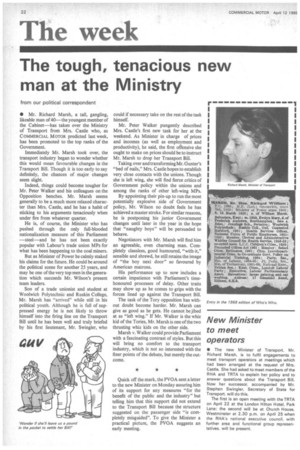The tough, tenacious new man at the Ministry
Page 24

If you've noticed an error in this article please click here to report it so we can fix it.
from our political correspondent
• Mr. Richard Marsh, a tall, gangling, likeable man of 40—the youngest member of the Cabinet—has taken over the Ministry of Transport from Mrs. Castle who, as COMMERCIAL MOTOR predicted last week, has been promoted to the top ranks of the Government.
Immediately Mr. Marsh took over, the transport industry began to wonder whether this would mean favourable changes in the Transport Bill. Though it is too early to say definitely, the chances of major changes seem slight.
Indeed, things could become tougher for Mr. Peter Walker and his colleagues on the Opposition benches. Mr. Marsh seems generally to be a much more relaxed character than Mrs. Castle, and he has a habit of sticking to his arguments tenaciously when under fire from whatever quarter.
He is, of course, the Minister who has pushed through the only full-blooded nationalization measure of this Parliament —steel--and he has not been exactly popular with Labour's trade union MPs for what has been happening to the coal miners.
But as Minister of Power he calmly staked his claims for the future. He could be around the political scene for another 25 years, and may be one of the very top men in the generation which succeeds Mr. Wilson's present team leaders.
Son of a trade unionist and student at Woolwich Polytechnic and Ruskin College, Mr. Marsh has "arrived" while still in his political youth. Although he is full of suppressed energy he is not likely to throw himself into the firing line on the Transport Bill until he has been well and truly briefed by his first lieutenant, Mr. Swingler, who could if necessary take on the rest of the task himself.
Mr. Peter Walker pungently described Mrs. Castle's first new task for her at the weekend. As Minister in charge of prices and incomes (as well as employment and productivity), he said, the first offensive she ought to make on prices should be to instruct Mr. Marsh to drop her Transport Bill.
Taking over and transforming Mr. Gunter's "bed of nails," Mrs. Castle hopes to establish very close contacts with the unions. Though she is left wing, she will find fierce critics of Government policy within the unions and among the ranks of other left-wing MPs.
By appointing their pin-up to run the most potentially explosive side of Government policy, Mr. Wilson no doubt feels he has achieved a master stroke. For similar reasons, he is postponing his junior Government changes until later in the year in the hope that "naughty boys" will be persuaded to behave.
Negotiators with Mr. Marsh will find him an agreeable, even charming man. Completely classless, good humoured, "with-it," sensible and shrewd, he still retains the image of "the boy next door" so favoured by American matrons.
His performance up to now includes a certain impatience with Parliament's timehonoured processes of delay. Other traits may show up as he comes to grips with the forces lined up against the Transport Bill.
The task of the Tory opposition has without doubt become harder. Mr. Marsh can give as good as he gets. He cannot be jibed at as "left wing." If Mr. Walker is the whiz kid of the Tories, Mr. Marsh is one of the two thrusting whiz kids on the other side.
Marsh v. Walker could provide Parliament with a fascinating contrast of styles. But this will bring no comfort to the transport industry, which is not so interested with the finer points of the debate, but merely the outcome.
Quick off the mark, the PVOA sent a letter to the new Minister on Monday assuring him of its support for any measures "for the benefit of the public and the industry" but telling him that this support did not extend to the Transport Bill because the structure suggested on the passenger side "is completely misguided". To give the Minister a practical picture, the PV0A suggests an early meeting.




































































































